| Last visit was: 25 Apr 2024, 02:40 |
It is currently 25 Apr 2024, 02:40 |

Customized
for You
Track
Your Progress
Practice
Pays
| FROM Nanyang Admissions Blog: HOW TO MARKET YOURSELF WITH YOUR PERSONAL VALUE PROPOSITION (PVP) |
|
Your PVP is an essential part of your job search toolbox. It helps you shape and define your personal brand, and allows you to articulate the value you bring to your target employer. And because your PVP is a “living” document, it needs to be updated and given regular attention throughout your professional life. What makes a great PVP? A robust PVP expresses the following attributes of your unique profile –– your expertise, skillsets, professional and academic achievements, and interests. Here are some guidelines to crafting a powerful PVP:
Your PVP should appear, at least in part, in the following mediums:
The Graduate Studies Career Development Office (GSCDO) at NBS helps participants craft their PVPs. Right from the beginning of your graduate studies journey, your GSCDO counsellor will assist you in developing your PVP as per your individual career search strategy and goals. They’ll coach you on how you can leverage your PVP in the marketplace. |
| FROM Nanyang Admissions Blog: The inaugural Professional MBA orientation |
|
The Nanyang Business School (NBS) at NTU recently commenced its inaugural Professional MBA program, with around 45 students forming its first cohort. This program went from conception to reality over the last 2 years, and is designed to – among other things – “enable high-calibre individuals fast-track their careers, while balancing work and family commitments”. I am proud to be a part of this prestigious program, and look forward to my journey with an excellent group of individuals as my peers, over the next 18 months. We kick-started this journey with a 2-day Orientation session on 1st and 2nd July, 2017, organized at the Keppel Leadership Institute. Most of us were already “connected” to each other, through the usual social media channels. Nonetheless, each of us awaited the Orientation event with excitement and enthusiasm, as the day approached to finally meet the cohort and the NBS faculty in person. The excitement was evident enough, with most participants showing up early at the venue, meeting peers and engaging in conversations over breakfast before the day’s events started. Day 1: Dr. Prof Douglas Streeter Rolph, Academic Director for the PMBA program, started the day’s proceedings and briefed us on the program, the ideas behind its conception and how it germinated from just an idea to the reality we were experiencing today. He also shared details of our class profile, and how we represented a wide mix of nationalities, industries, age and experiences. It was particularly encouraging to note how diverse the cohort was, and how enriching that makes this program in terms of networking opportunities and peer-learning for every single one of us.  The day’s events continued, with Professor Peter Guilioni (fondly known as Pete) introducing us to the NBS Graduate Studies Career Services team, and how it will play a crucial role in our career strategy and planning over the course of this program. Prof Pete made sure he had the audience rapt, with his energy and anecdotal humour, while sharing valuable suggestions on how we could plan, draft and execute winning strategies for our career goals. The post-lunch session comprised team-building activities organized by the famous Albert King. Albert fired the session up with a simple, but thought-provoking question – “Where do trees come from?” – I’ll let you readers contemplate on the philosophical and practical implications of that question.  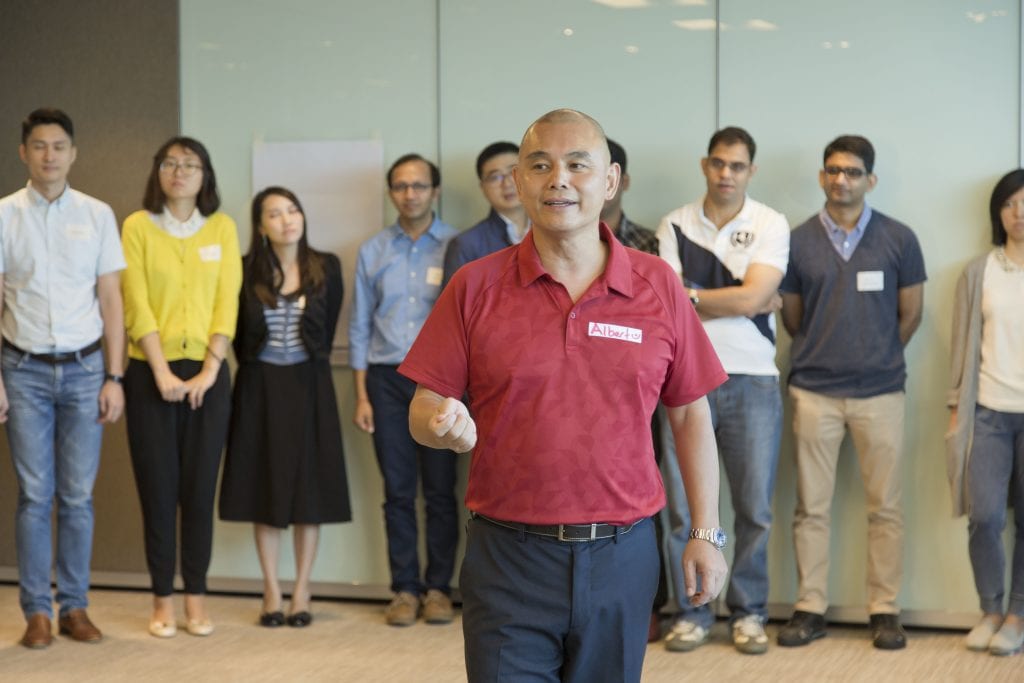 Another interesting activity that each of us did, was write a letter to our future selves, meant to be read at the conclusion of this program. I’m certain that this activity made each of visualize our journey over the next 18 months, and imagine ourselves at that juncture in our career and lives. Albert then got us into the neighbouring room, where the real action started, and we soon began playing out various team building activities – some as individuals and others in groups. Through each activity, I had the chance to meet another, know some more about him/her and in turn share something about myself with them. Our final event was a variant of the “Blind Square” activity that served as a form of experiential learning, exemplifying the importance of seeing the end-state of things (or the “big picture”). 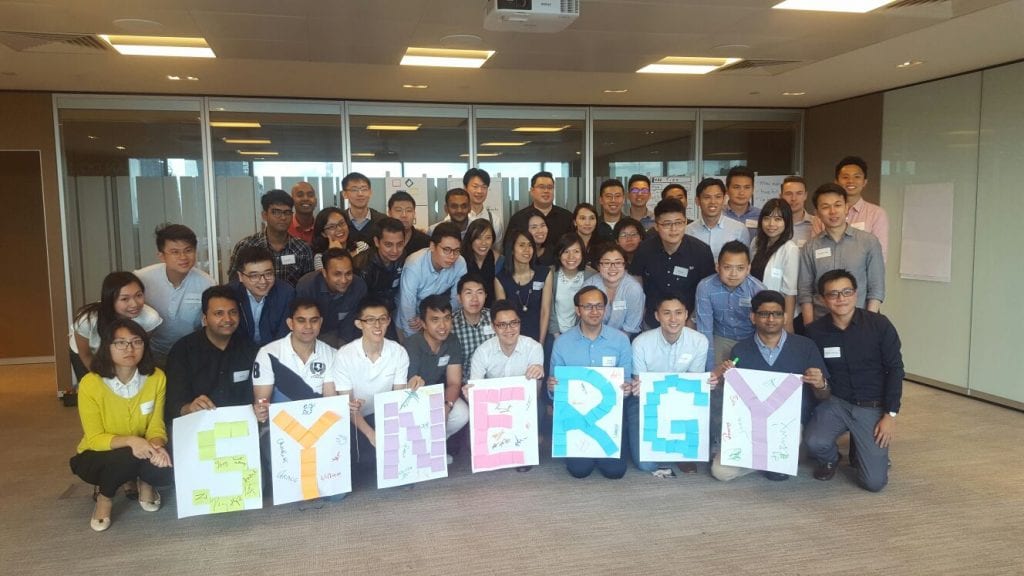 The day drew to a close with a group photo of the participants, and a loud cheer on our faces – we are a well-knit family now, and our mission has officially begun! Zhang Ran, a PMBA program participant, had this to say about the Orientation program: “I would say the benefits we have got didn’t just stay in those 2 days…. the atmosphere we created in that group has built a quick trust among ourselves. We remind each other, we share what we know, and we help and take responsibilities that benefit the group.” Day 2: A key agenda of the day was the Individual and Group Photoshoot. The ladies were dressed to the nines and the gents were dressed to kill! Well, hyperboles aside, the photoshoot of the day would give us our most suitable LinkedIn profile photo, fit for the next couple years (or longer?). We were all dressed crisp and smart, and looked every pixel like the businessmen and businesswomen we aspired to be. 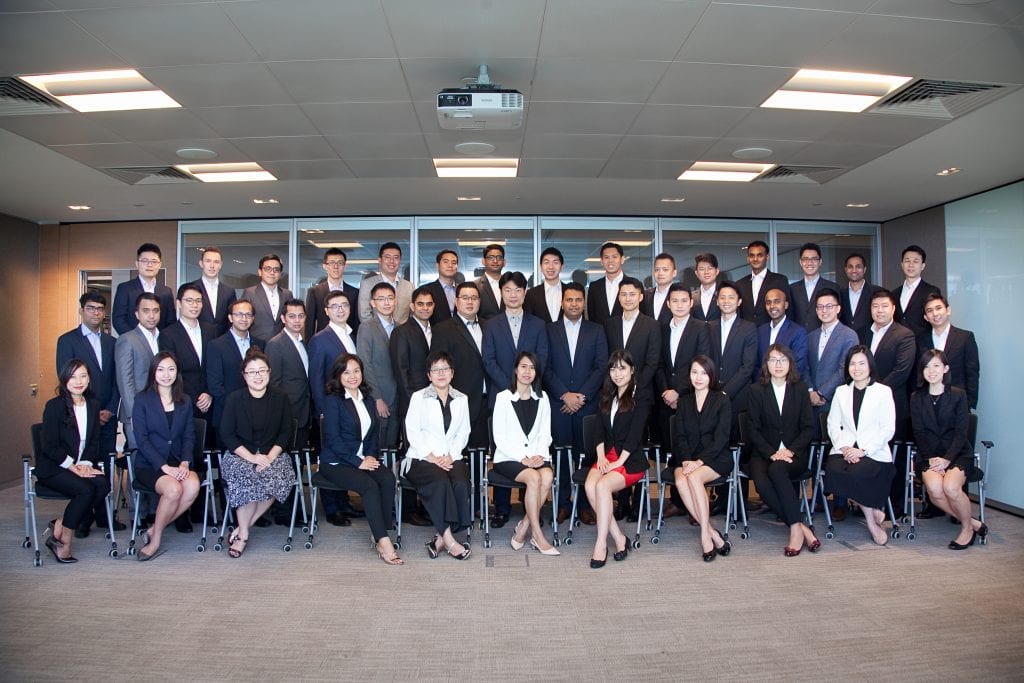 Following the photoshoot, we had some quick but informative sessions on using the School’s IT and Business Library resources. The post-lunch session was probably the highlight of this 2-day Orientation – the “Introduction to Case Study Method” by Professor Vijay Sethi, winner of the Economist Intelligence Unit’s “Business Professor of the Year” award. This 4-hour session introduced us to the case study method, but more broadly speaking, the importance of critical thinking. Prof Sethi’s session was laced with several examples and real-world scenarios and their implications, and how they tied back to us being astute and analytical while assessing them. Wei Keat, one of the program’s participants, felt the following about the Case-Study method: “the case study method introduced by Prof Sethi was really an eye opener for us. It gave us the insight on how to read, understand and tackle a case study. This was a good warm up session for us before the courses start, and it builds our foundation in analytical thinking.” We completed the day’s proceedings with an actual Case Study exercise, and with Professor Sethi summarizing the right way to think for us: “It means being conscious and aware enough to choose what you pay attention to and to choose how you construct meaning from experience”. Our final event for the day was the networking session, where the PMBA program candidates met each other, in a more informal setting over light refreshments and drinks. Interestingly, the day also saw us witnessing what was probably practice sessions for the NDP 2017 State Flag flypast – a metaphorical symbol marking the beginning of our own journey that started today! “Majulah Singapura”. 
|
| FROM Nanyang Admissions Blog: More than numbers: a PhD in Accountancy with NBS |
|
What accounts for the allure of the Nanyang Business School (NBS) PhD accountancy programme? Xu Tu who graduated this year has already been offered a position as Assistant Professor with the University of Hawaii at Manoa. 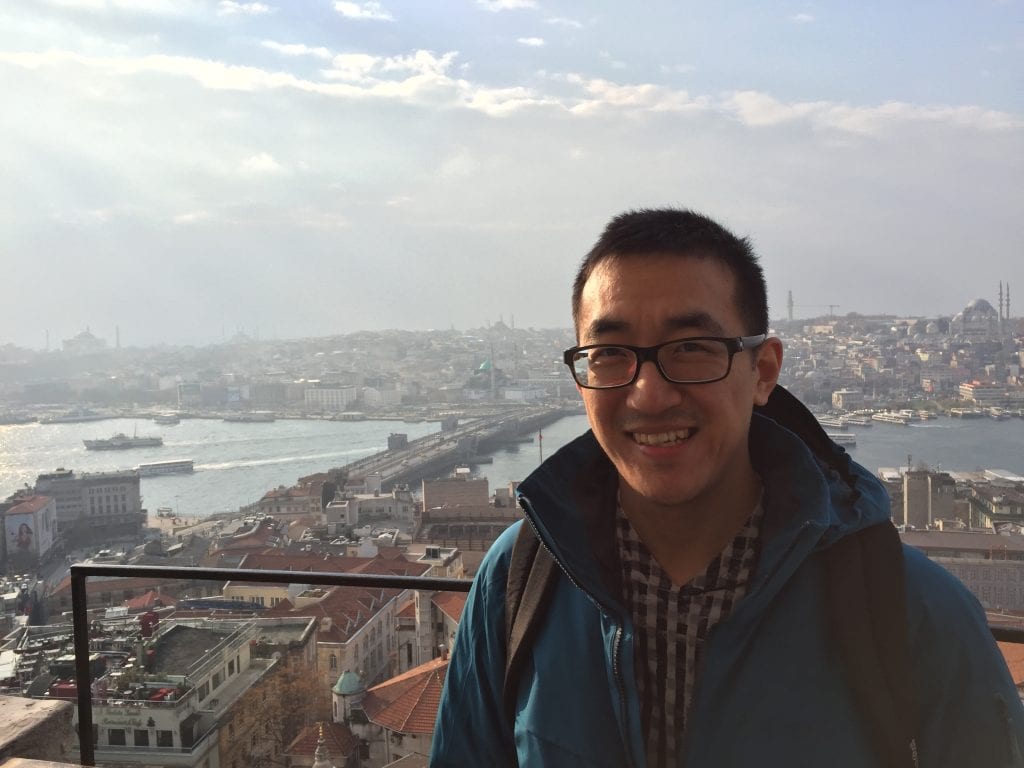 He came to NBS via a circuitous route. He had started doing his PhD programme at Georgia State University, but after two years, due to unexpected faculty movement, he could not continue his programme there. He said it was an easy transition as the structure of the NBS programme is quite similar to the US PhD programme, where participants undertake a couple of years of coursework before they start on their thesis. Of the differences, Xu Tu appreciates that there was more support in terms of funding from NBS. Xu Tu’s advice for students deciding on a PhD programme: “The NBS programme is on par with many of the best programmes in America. It is well recognised internationally. The frequent research seminars with visiting professors from all over the world provide an intellectual and innovative arena for learning, as well as opportunities to network. Plus, I received full financial support to attend two conferences in the US, which allowed me to meet other researchers.” Finally, he advises that students deciding on their future schools need to be forward thinking – that it is important to look at the placement history of the school. He reckons he was able to obtain as good a post as quickly as he did thanks to reputation of the NBS Accountancy programme and worldwide acknowledgement of the excellence of its faculty. Lukas Helikum is a fourth-year student, going on to the fifth year. His bachelor and masters degrees were both from Maastricht University, during which time he had spent a term at NBS as part of an exchange programme. Thus when he was picking a university for his PhD programme, he considered NBS. He spoke to faculty members and found that their research was aligned with his own areas of interest. 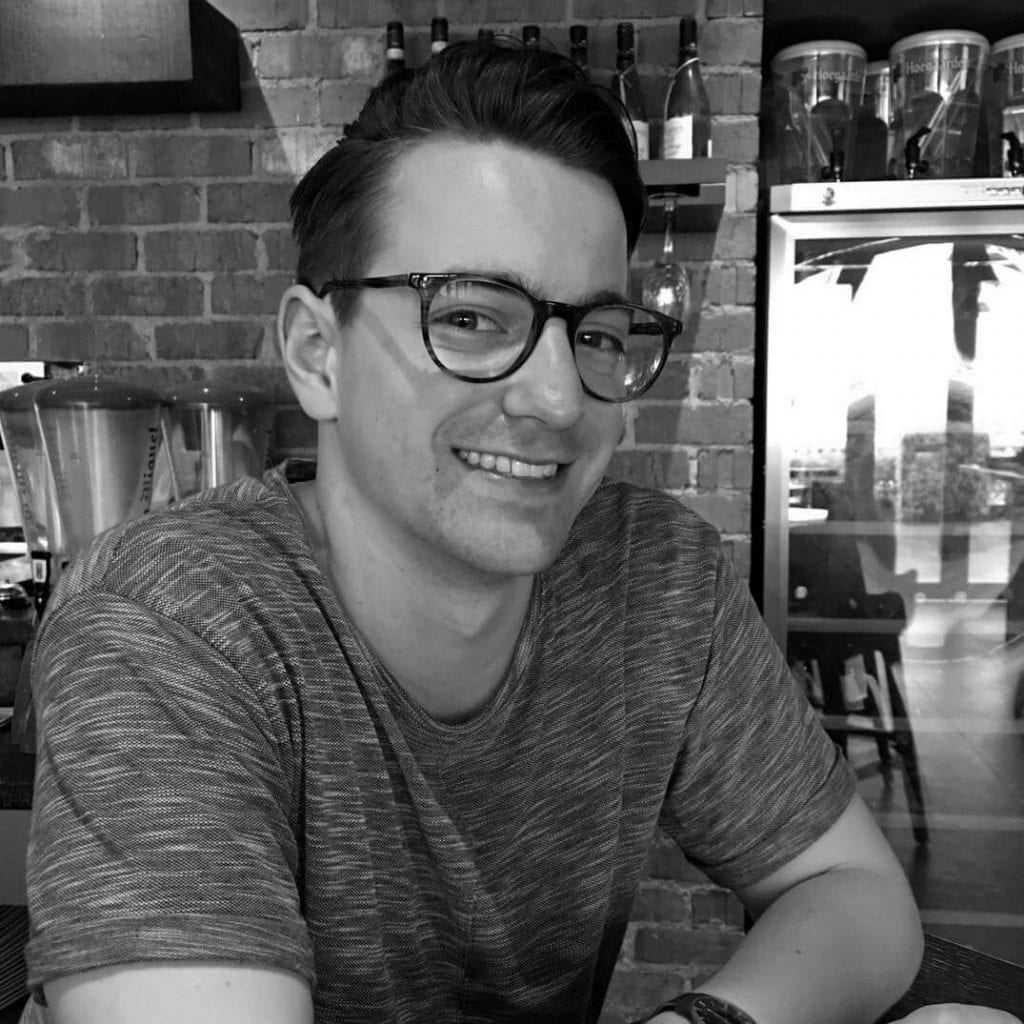 Lukas especially likes that the course comprises one-and-a-half years of coursework before he started on his thesis. This ensured he was well grounded in research methods, and also familiar with the latest research; unlike some universities in some countries, which allow PhD students to directly embark on their thesis. He also appreciated that the facilities and support system – physically and financially – are also very good, especially when he notes that his friends in other universities and countries often struggle to obtain funding for their research as well as travel. Of his decision to go to NBS, Lukas reiterates that it is very important to go to a school where the faculty is well-respected among the research community, and the rigour of the coursework and research programme internationally acknowledged; for example, Professor of Accounting and UOB Chair, Prof Tan Hun Tong, is known for training students in analytical skills. Lukas also credits the seniors who had gone before who had performed well, continuing to give credence to the training environment at NBS. While most universities focus on either archival or behavioural research, and most Asian universities are focused on archival research, with less emphasis on behavioural research, NBS is the only school in Asia that encourages both aspects of research. The end-product are students who are balanced in their theoretical approaches, and who had been exposed to the full range of research methods, domains and theoretical approaches. The small student-faculty ratio at NBS facilitates close interaction with faculty, ensuring doctoral students are well-guided, and resulting in joint publications presented at top international conferences and published in major journals. The statistics and facts bear it out. NBS has always ranked well among the accounting departments around the world, and also in Asia in terms of research productivity. Beyond rankings, faculty members have a solid reputation for quality work – their research have been published in major accounting and finance journals including The Accounting Review, Journal of Accounting Research, Journal of Accounting and Economics, Journal of Finance, Contemporary Accounting Research, Accounting, Organisations and Society, and Review of Accounting Studies. Faculty members also often serve as reviewers or associate editors of major accounting journals. Recent graduates of the programme have taken faculty positions at University of South Carolina, University of Alberta, University of Hawaii, Concordia University, University of Massachusetts Amherst, University of Warwick, University of Hong Kong, City University of Hong Kong, University of Melbourne, Australian National University. National University of Singapore, and top research universities such as Peking University in China. |
| FROM Nanyang Admissions Blog: MBA helps spur healthcare leader’s career success in China |
 Jiang Wei Wei Class of 2009, MBA (FINANCE) Air Liquide China Holding Co. General Manager (Home Healthcare) It came down to a choice between pursuing an MBA at Nanyang Business School or at a rival institute in Singapore for Jiang Weiwei, senior director and head of healthcare for China at Air Liquide, a French-listed multinational supplier of industrial and medical gases. Jiang, who had a master of electrical engineering and a bachelor’s degree in materials science at the time, says she chose NTU’s MBA programme because of its higher international ranking and specialised subjects in finance, which would enable her to gain in-depth knowledge of finance. Pursuing an MBA at NTU would “accelerate my learning curve by gaining business knowledge that I didn’t learn in school”, says Jiang, who completed her MBA in Finance in 2009. She says she has also gained a competitive advantage over peers who are not MBA holders, thanks to her business study and knowledge of finance management, accounting and investment. “I can challenge all the assumptions in the business plans,” she explains. In December 2016, Jiang was promoted to senior director after serving as Air Liquide’s general manager of home healthcare in China since 2013. The company’s healthcare division services 1.4 million patients at 15,000 hospitals and clinics around the world. Last year, it accounted for €3.1 billion of Air Liquide’s total global revenue of €18 billion. To date, Jiang has worked on several merger and acquisition projects for Air Liquide in the home healthcare and medical gas markets. She searched for companies with potential and performed due diligence work. Her work taught her to build relationships with the owners of takeover targets, identify operational synergies between those companies and Air Liquide, seek investment approval for such projects, and integrate the new subsidiaries into Air Liquide’s operations. Before becoming a business leader, Jiang learnt about the value of teamwork in her group discussions and projects at Nanyang Business School. “That was quite fun because people came from different backgrounds and expertise, different levels of skills and career paths, so you learn to deliver a project and to accommodate and engage everyone in the team,” she says. That experience stood her in good stead when Air Liquide asked Jiang to start a new home healthcare business. She conducted a study of the market, hired people, built relationships with suppliers, liaised with external laboratories to test the products, and secured management’s approval. “The most difficult part of the project was that we had to complete it within three months,” Jiang says. “I certainly benefited from my MBA experience in the way I managed the project as a leader. “The MBA programme gave me the tools and financial knowledge … to do my job better.” Jiang, who is based in Shanghai, says her work as a business leader is about finding the right people and giving them the appropriate tasks, motivations, incentives and guidance. She credits the MBA case studies she had read with influencing her leadership style. For those who seek to be business leaders, Jiang has this advice: “Try to give yourself sufficient time to listen to people, observe and think thoroughly as much as possible before making the decision. “Once a decision has been made, try to back it up and do not change it easily. However, do not hesitate either to change and admit that you’ve made a mistake if it is right thing to do.” Business resources and energy could be wasted if leaders fail to listen to others and leap to wrong conclusions, she adds. Since completing her MBA studies, Jiang has attended informal gatherings of MBA alumni, and she’s found the network helpful to her career, although opportunities for such gatherings have become few since she relocated to Shanghai. Before moving to China, Jiang joined Air Liquide in Singapore. To develop her career in the company, she asked to join its healthcare division, which was smaller than the more mature industrial division, because of her interest in healthcare and she felt that China’s healthcare market “was going to boom” because of its fast ageing population. The mainland’s dependency ratio for retirees could reach 44 per cent by 2050, according to the United Nations. The dependency ratio compares the difference between those not in the labour force with those who are working, or can work full-time. Jiang says she joined the healthcare business because she could have a larger business contribution to the company, as the industrial division was already established. “My decision was right because the healthcare business has been growing. Although healthcare is much smaller than industrial but certainly we are getting the focus of the group, we are getting the investment from the group,” she says. “Over the long term, home healthcare is a very promising industry, especially in China.” |
| FROM Nanyang Admissions Blog: Executives could benefit from going back to their books. |
One Johnson & Johnson Southeast Asia Senior IT director shares her experience in the Nanyang EMBA programme. Junko Kimura Senior IT Director, Southeast Asia One Johnson & Johnson Nanyang EMBA Class of 2018 In her past seventeen years at Johnson & Johnson, Ms Junko Kimura hardly considered pursuing further studies, due in part to her Japanese cultural background. “Employees in Japan want to stay with their company for a long time, especially if they are working for domestic companies. Most people feel like they do not need an MBA (Master of Business Administration) because they can learn from more experienced executives in their companies,” said Ms Kimura, who became Johnson & Johnson (J&J) Southeast Asia’s Senior IT Director and Business Technology Leader in June 2016. Things changed for Ms Kimura when she moved from Japan to Singapore for her new role. After three months of focusing on her new role, she decided to pursue further studies while working. She wanted to improve her business management skills, which are especially important in her management work, she said. She therefore signed up for the Nanyang Executive MBA programme, which her colleagues had recommended. The 14-month Nanyang EMBA programme aims to enhance senior executives’ leadership capabilities without interrupting their careers. They can choose from three tracks: General Management, Aviation & Air transport and Hospitality Management. As a student on the General Management track, Ms Kimura has picked up skills which have proved to be useful for her work. She is responsible for overseeing the IT activities for all three business sectors – consumer products, medical devices and pharmaceuticals – at One J&J Southeast Asia. The sectors cater to six main markets: Philippines, Thailand, Indonesia, Singapore, Malaysia and Vietnam. One difficulty Ms Kimura faces is reconciling IT programmes, which are often technology-intensive, with business strategy, she said. Furthermore, each business sector has its Global IT strategy, and her team needs to tailor these strategies to the unique direction of Southeast Asia markets, she added. The course on cultural intelligence helped her with this, as she learned to manage the expectations of her employees from six different countries. She cited her country, Japan, where employees are often very focused on meeting deadlines. In contrast, workers from other countries might have a lighter sense of urgency. Japanese employees also place a heavier emphasis on punctuality, as compared to their overseas counterparts. “It is therefore critical to have a deep understanding of culture, so that we can achieve our common goal,” she said. “From the course, I learned how to form a team and communicate with them by looking at each person’s strengths and weaknesses, before allocating duties. These management skills are relevant to my current job, as my team consists of people with different cultures.” So far, Ms Kimura has completed several core courses such as Cultural Intelligence, Accounting for Decision-Making & Control, and Corporate Finance for Strategic Decision-Making. She also spent a week at The Wharton School at the University of Pennsylvania, where she took a course in Corporate Strategy & Financial Value Creation. She will spend another two weeks at The University of California, Berkeley, studying two modules in Leadership Accelerator and Innovation & Entrepreneurship. “Through these courses, I have gained a better understanding of management principles,” Ms Kimura said. “Before this, my knowledge was mostly based on experiential learning. I wanted to have a stronger academic background to complement my experience and knowledge.” The structure of the Nanyang EMBA also makes it easy for students to juggle school and their busy work schedules, she added. Established in 2007, the programme spans five segments with two to three weeks each. This means that executives can get their EMBA without being absent from work for a long time. Each track has an average of 40 students, who are from Singapore, Europe, the US, Africa and Southeast Asia. The diversity has provided students with good networking and business opportunities, said Ms Kimura. “We are able to meet executives from other companies and share our knowledge. It’s also a great community because the students take care of one another – for example, we help others to express their ideas clearly by building the conversation in the session. I could see a lot of great people-managers in the class” Students also put their knowledge into practice as they work on a Live Industrial Consultancy Project. Under the project, a collaboration between sponsor companies and the Nanyang EMBA programme, participants work in groups and take on an actual consultancy project. Ms Kimura’s team has partnered a global water treatment company, and is working with the company on market research and development for its portable water brand. The project has helped her to experience the market access strategy setting and execution by agile approach in parallel with team-building and communication skill development, which are relevant to her career growth. “The professors are also very helpful, as they are quick to respond to students’ queries. For example, Prof Vijay Sethi has been a patient mentor to our project group,” she said. Looking back, she is glad that she applied for the Nanyang EMBA, as it has honed her management skills. “The Nanyang EMBA offers good opportunities for us to interact with senior level people who are very insightful. The programme has allowed me to have a new perspective on important issues and challenges and most importantly, I am enjoying this learning journey.” |
| FROM Nanyang Admissions Blog: Interview with Fellows MBA alumna, Col Jerica Goh |
|
Overseeing a naval warship is no easy job. It requires leadership skills of the highest level and the utmost respect from the ship’s crew. With its focus on cultivating robust leadership and management skills, Colonel Jerica Goh saw the Nanyang Fellows MBA as the ideal preparation for her future role as the commanding officer of the RSS Supreme – the navy’s most advanced warship. We sat down with Colonel Goh, Singapore’s highest-ranking female naval officer, to look back at her Nanyang Fellows MBA experience.  Colonel Jerica Goh Head, Naval Training Republic of Singapore Navy Nanyang Fellows MBA, 2011 NBS: Why did you decide to do an MBA? Jerica Goh: I thought it would be good to acquire skills such as management and leadership, which are related to the things that we do in the navy but in a different context. Was an NTU MBA your first choice? Yes, NTU was my first choice. I found the design of the Nanyang Fellows programme to be well thought out as it covers various aspects of management and leadership. On top of that, the programme included modules at the MIT Sloan School of Management as well as The Wharton School at University of Pennsylvania. Each university focused on different things and it was overall a very valuable and enriching learning experience. We also get to work in teams on live consultancy projects with selected companies that gave us the chance to apply what we have learnt to real situations. What do you remember about the professors who taught you? We were very fortunate. The professors teaching were all very experienced, so we learnt a lot from the knowledge they’ve gained over the years. I remember Associate Professor Patricia Tan, she was always so enthusiastic and brought a lot of life to her accounting lectures. I also remember Professor Hong Hai, who introduced the ancient wisdom of East Asian cultures and how it continues to drive values and practices today. And of course, Professor Lim Chong Yah, a fatherly figure, sharing stories of his work at the National Wages Council and his insights on the economic development of Singapore. I also particularly enjoyed Associate Professor Sasha Chernyshenko’s Talent Management module. He had a very candid and engaging way to bring out the ideas and issues of developing and retaining talent. Where were the participants in your cohort from? Other than Singaporeans, we had participants from Australia, Cambodia, Germany, India, Indonesia, Kazakhstan, Korea, Myanmar, Pakistan, Philippines, Sri Lanka and Vietnam. It was a diverse cohort consisting of people from different cultural backgrounds and work experience. Was this diversity beneficial to the learning experience? Yes, it was. We were involved in many case studies where participants brought their different perspectives to the discussion – especially cultural differences. It gives you a glimpse of how they do things in their country. Were there any lessons you learnt that still stand out for you today? The key lessons are that we must listen and be responsive to the world around us and that coupled with a positive attitude, commitment and integrity, we can make a difference in whatever paths we take. What’s your fondest memory of your time at NTU? It’s the bonds we build with the cohort through the classroom discussions, group projects and also the overseas study trips to US and Denmark. How has the Nanyang Fellow MBA helped your career in the navy? Not only did I learn about the workings of the world, the programme allowed me to do a lot of reflections. When working with people, it is important to stick to core values and be authentic. These complement the training that I received in the Navy and allowed me to be a better leader. What inspired you to embark on a military career? It was by chance that I got to know about the career option after A levels. Looking back, I’m glad that I joined the navy. I get to play a part in the defence of Singapore, work in a dynamic and fast-paced environment, and, be part of a cohesive team. What’s it like being the highest-ranking female naval officer in Singapore? No different from when I was in my previous ranks. (laughs) I continue to focus on completing each task properly, a day at a time. |
| FROM Nanyang Admissions Blog: Executives could benefit from going back to their books. |
One Johnson & Johnson Southeast Asia Senior IT director shares her experience in the Nanyang EMBA programme. Junko Kimura Senior IT Director, Southeast Asia One Johnson & Johnson Nanyang EMBA Class of 2018 In her past seventeen years at Johnson & Johnson, Ms Junko Kimura hardly considered pursuing further studies, due in part to her Japanese cultural background. “Employees in Japan want to stay with their company for a long time, especially if they are working for domestic companies. Most people feel like they do not need an MBA (Master of Business Administration) because they can learn from more experienced executives in their companies,” said Ms Kimura, who became Johnson & Johnson (J&J) Southeast Asia’s Senior IT Director and Business Technology Leader in June 2016. Things changed for Ms Kimura when she moved from Japan to Singapore for her new role. After three months of focusing on her new role, she decided to pursue further studies while working. She wanted to improve her business management skills, which are especially important in her management work, she said. She therefore signed up for the Nanyang Executive MBA programme, which her colleagues had recommended. The 14-month Nanyang EMBA programme aims to enhance senior executives’ leadership capabilities without interrupting their careers. They can choose from three tracks: General Management, Aviation & Air transport and Hospitality Management. As a student on the General Management track, Ms Kimura has picked up skills which have proved to be useful for her work. She is responsible for overseeing the IT activities for all three business sectors – consumer products, medical devices and pharmaceuticals – at One J&J Southeast Asia. The sectors cater to six main markets: Philippines, Thailand, Indonesia, Singapore, Malaysia and Vietnam. One difficulty Ms Kimura faces is reconciling IT programmes, which are often technology-intensive, with business strategy, she said. Furthermore, each business sector has its Global IT strategy, and her team needs to tailor these strategies to the unique direction of Southeast Asia markets, she added. The course on cultural intelligence helped her with this, as she learned to manage the expectations of her employees from six different countries. She cited her country, Japan, where employees are often very focused on meeting deadlines. In contrast, workers from other countries might have a lighter sense of urgency. Japanese employees also place a heavier emphasis on punctuality, as compared to their overseas counterparts. “It is therefore critical to have a deep understanding of culture, so that we can achieve our common goal,” she said. “From the course, I learned how to form a team and communicate with them by looking at each person’s strengths and weaknesses, before allocating duties. These management skills are relevant to my current job, as my team consists of people with different cultures.” So far, Ms Kimura has completed several core courses such as Cultural Intelligence, Accounting for Decision-Making & Control, and Corporate Finance for Strategic Decision-Making. She also spent a week at The Wharton School at the University of Pennsylvania, where she took a course in Corporate Strategy & Financial Value Creation. She will spend another two weeks at The University of California, Berkeley, studying two modules in Leadership Accelerator and Innovation & Entrepreneurship. “Through these courses, I have gained a better understanding of management principles,” Ms Kimura said. “Before this, my knowledge was mostly based on experiential learning. I wanted to have a stronger academic background to complement my experience and knowledge.” The structure of the Nanyang EMBA also makes it easy for students to juggle school and their busy work schedules, she added. Established in 2007, the programme spans five segments with two to three weeks each. This means that executives can get their EMBA without being absent from work for a long time. Each track has an average of 40 students, who are from Singapore, Europe, the US, Africa and Southeast Asia. The diversity has provided students with good networking and business opportunities, said Ms Kimura. “We are able to meet executives from other companies and share our knowledge. It’s also a great community because the students take care of one another – for example, we help others to express their ideas clearly by building the conversation in the session. I could see a lot of great people-managers in the class” Students also put their knowledge into practice as they work on a Live Industrial Consultancy Project. Under the project, a collaboration between sponsor companies and the Nanyang EMBA programme, participants work in groups and take on an actual consultancy project. Ms Kimura’s team has partnered a global water treatment company, and is working with the company on market research and development for its portable water brand. The project has helped her to experience the market access strategy setting and execution by agile approach in parallel with team-building and communication skill development, which are relevant to her career growth. “The professors are also very helpful, as they are quick to respond to students’ queries. For example, Prof Vijay Sethi has been a patient mentor to our project group,” she said. Looking back, she is glad that she applied for the Nanyang EMBA, as it has honed her management skills. “The Nanyang EMBA offers good opportunities for us to interact with senior level people who are very insightful. The programme has allowed me to have a new perspective on important issues and challenges and most importantly, I am enjoying this learning journey.” |
| FROM Nanyang Admissions Blog: Tips to ace the Nanyang MBA admissions |
Nanyang Business School (NBS), the business school of Nanyang Techonological University, Singapore (NTU Singapore) is widely regarded as Singapore’s premier business school and is consistently ranked amongst the world’s best. Since 2004, NBS has been ranked #1 in Singapore by The Economist Full-Time MBA rankings. In the Financial Times Global MBA Ranking 2017, the flagship programme came in 24th worldwide. The 12-month transformational programme allows participants to gain deep, practical real-world insights into business models, management philosophies and rigorious acadmic theories across a variety of industries to prepare to excel in the global environment. Participants who wish to extend their experience may join one of the double masters programmes offered with the Waseda Business School (Japan), ESSEC Business School (France) or St Gallen University (Switzerland). Just about every business school MBA application has student write essays to questions so how do you write a good essay which will stand out among the applications? This is your opportunity to effectively relate something important to you and impressive about you to persuade the admissions committee to accept you. Ultimately, schools are trying to find out what differentiates you from other candidates and if you will be a good fit in their programme. So how do you do that? Firstly, read the question carefully and make sure that you are answering it. Your essay should have a good structure and the information should flow in a logical order. Get someone to read your essay and guess what the question was. The Nanyang Business School Admissions Committee members read hundreds and thousands of essays each year. Use lively language, anecdotes from your personal and work life to make the essay interesting and which showcase your personality. Remember to proofread it. Spelling and grammar mistakes are likely to send your application to the rejection pool in the speed of lightning. So you’ve been shortlisted and invited to the selection interview and what should you expect? One should view the selection interview as a way of getting to know each party better. The interview panel aims to get to know more about you, your personal and professional achievements, your leadership potential, how the programme can add value to your post-MBA career aspirations and your language proficiency level. On the other hand, you should take this opportunity to ask questions which have not been addressed in the marketing materials, such as if there will be any curriculum changes, how does the business school or programme develop relationships with your post-MBA target industry, etc. Most importantly, remember to be yourself! Don’t try to think and be what you think the business school wants to see and hear! 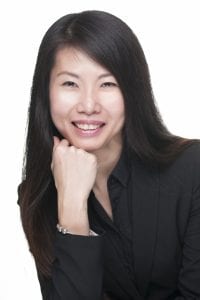 Ms Winnie Suli Yong Manager, Marketing & Admissions Graduate Studies, Nanyang Business School |
| FROM Nanyang Admissions Blog: A Palauan native’s MSc Accountancy journey here in NBS |
Nanyang Business School (NBS) will soon have its first Masters’ graduate from the Republic of Palau, an island located in the Western Pacific ocean, and host to about 20,000 inhabitants. Ms Danielle Jean-Marie Willis is currently pursuing her graduate studies in the MSc Accountancy programme, and is due for graduation in six months. We chatted with Danielle about her academic journey – her far-flung beginnings and beyond: Hi Danielle, tell us more about the Republic of Palau – you are our first Palauan enrolled here in NBS. It’s known for being a tourist destination, and we have only one community college (two-year programme), so you can’t get a bachelor’s degree. People have to leave in order to pursue further education. Has there been anyone else from Palau who has considered coming to Singapore? Not that I know of, but they are trying to implement the structure of Singapore’s education system back there. I had to apply for a loan to get here, and the reason they granted the loan was so that more of us from Palau could be educated overseas and then go back and share our experiences. That would contribute to their education system. What about the academic journey you took before finally arriving at NBS, Singapore? (Palau > Taiwan > Singapore) I managed to get a scholarship from Taiwan. Every year they award five-year scholarships, one year to be completed in Chinese and then four years in English. So, is the community college in Palau modelled after the US system? Yes, the two years of Community College in Palau are modelled after the community colleges in the United States, which are similar to the junior colleges here in Singapore. What was it like transiting from a US system to an Asian one? I jumped from taking four modules a semester to anywhere between eight and 15 modules a semester in Taiwan, which was quite a lot to handle for me. I had to learn to adapt, balance, and manage my time across all those modules. What made you decide on Nanyang Business School’s MSc Accountancy programme? Well this school is quite famous in Asia. In Taiwan they hire quite a lot of their senior managers who’ve gone to this school. What was it like taking your undergraduate programme in Chinese previously, was it a choice?
Learning in Chinese meant I had to do a lot of self-learning and preparation before classes. In class, I’d understand about 60-70% of what was taught, and the rest I had to just learn on my own through the notes I took or through the textbooks. How do you think your work experience so far as an audit intern and a junior auditor will help contribute to your MSc Accountancy experience? We have an audit module, and in class the teacher always looks to us to share our experiences or thoughts. Auditing is so different from accounting, because it involves a lot of practical experience and procedures that can’t be learnt in class and is hard to grasp. A lot of my classmates who don’t have work experience feel that they can ‘see the trees, but not the forest’ (bigger picture). What were you looking forward to the most in NBS? Did it match your expectations? Undergraduate education was a lot of one-way learning, where I would attend my lectures, take notes and try to get through the exams every semester. We never gave any presentations or had too many discussions with fellow classmates. But I’ve found that I learn a lot more from discussions and group projects, which I get to experience now in NBS. Do you have any friends from Taiwan enrolled here with you in NTU/NBS? No, there is one girl from Taiwan, but I’m friends with a diverse group here in NBS. I’ve made really good friends here. I never actually had any back in Taiwan, probably because there was no time to socialize. Do you already have a favourite professor here? I like Professor Lee Kin Wai; I think I like his attitude. Everyone respects him, because he knows what he’s talking about. A lot of professors at the graduate level are practitioners in their industries. With Prof Lee for example, when he talks it’s easy for us to digest it because it is practical knowledge. I also like Professor Premila Gowri Shankar – she’s smart and a good role model for us students, especially the female ones. In her role as Junior Auditor at the Office of the Public Auditor (Palau) in the past year, Danielle has already audited the government at National and State levels, assisted with the completion of two State audits and one grant audit, and assisted with the preparation of two performance audit reports – all in a span of a few months. No better way to pay back the island’s good faith in her. About the MSc Accountancy The MSc Accountancy programme is offered by Nanyang Business School (NBS) at Nanyang Technological University, Singapore (NTU Singapore). NTU Singapore is currently ranked 11th in the world by QS World University Rankings, making it the top University in Asia. NBS ranks number 1 in Asia for its accountancy research (all years) and also its Ph.D. programme in Accounting (source: Brigham Young University Accounting Rankings). The programme can be completed in a year by full-time students, and in two years by part-time students. It is conducted in English and its academic rigour is complemented with strong career support from by the Graduate Studies Career Development Office (GSCDO), which helps the students procure suitable jobs with ease post-graduation. Visit www.beyondanmba.com/programme-msc-acc.aspx to learn more. |
| FROM Nanyang Admissions Blog: It more than doubly met my expectations |
Ken Koort, 37, is Chairman of the board of Diamond Group, a holding company registered in the Republic of Estonia. The group holds shares in real estate, IT, fuel, and aviation company Diamond Sky, of which Ken is CEO. Diamond Sky operates and manages private and business aircrafts inside EU and CIS countries. Ken is a pilot himself. He and his wife Kristiina are also partners in their family loud-speaker business.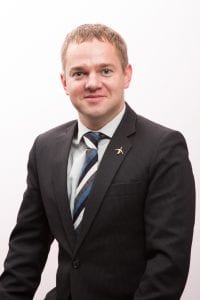 Ken Koort – Nanyang EMBA, Class of 2015 Ken has a degree from the Moscow State University for International Relations. He recently obtained an Executive MBA with an Aviation track from NBS. It happened quite almost serendipitously. Years ago, Ken was visiting IATA (International Aviation Transport Authority) training centre in Geneva which had a joint programme with University of Geneva; after an intensive interview with the director of the programme he was given a recommendation to apply to NBS/NTU instead. Ken spent a year thinking about and researching MBA programmes worldwide. He finally decided to join the MBA programme in Singapore, based on its excellent reputation and the quality of the faculty which is highly regarded worldwide. He had also been working in aviation for years, and was attracted to its Aviation track, which is unique in the world. (The EMBA also offers tracks into shipping, hospitality and General Management.) He knew it was the right programme for him. Another important consideration – Ken had lived and travelled widely around Europe; he had also undergone training in the US; but Asia was a region he had had little experience with. He was keen to know more about how it worked, its culture, and certainly more about the potential of the aviation market. He did not regret his decision. He said, “It more than met than doubly met my expectations.” He greatly enjoyed his “eye-opening experience”. He learnt to see things differently via the brainstorming sessions, with classmates who came from all over the world, providing rich exchanges on both the business and social arenas. They also brought their different corporate experiences from their own companies, for example, one classmate brought his experience of running an airport, which added hugely to the overall learning. Ken was also impressed by the quality of the professors and the range of expertise and networks they had between them. He liked that the course was well- structured and the programme well-organised. The case studies were similar to those you could get from Harvard and other top business schools, so he was able to learn about best practices from around the world. He said confidently that he speaks for the other classmates as well, to say that as a whole they were very satisfied with the programme. Plus, he added, “We had our own chef (one of the classmates) during course, what more can you want?” To those still debating whether to do an MBA, he says, “Do it. You get a better qualification, amd you develop a lot of important skills which will help enormously in your career.” He adds though, “Because you will be spending 18 months of your life doing it, choose your university and programme wisely.” Visit www.beyondanmba.com/programme-emba.aspx to learn more about the Nanyang EMBA. |
| FROM Nanyang Admissions Blog: MSc Acc: Academic Rigour, Flexibility and the Opportunities |
|
It is a lot easier these days to gain valuable business perspectives, be sought after by the Big Four accounting firms, and yet be afforded flexible schedules with the MSc Accountancy programme offered by Nanyang Business School (NBS). Pursuing an MBA programme in Accountancy provides its students with a solid foundation in business and financial skills needed across all industries. There is access to valuable internship opportunities while still in school and they stand to command better positions and higher salaries upon graduation. What is great about NBS’s MSc Accountancy programme is that it is a big opportunity for non-Accountancy graduates to gain entry into the sector, while also providing career advancement for those already in the accounting and finance sector. We approached three of our students, past and present, to offer us their thoughts on how the programme has contributed to their lives and careers. Tengfu Li, Senior Lead Analyst at OCBC 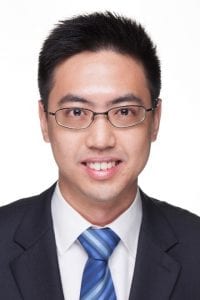 Tengfu, like many others in the financial sector, got his undergraduate degree in electrical engineering, and initially found that he was able to grasp the fundamentals of finance without needing a degree in the field. It was only when his responsibilities grew at work, did he realise that he lacked sufficient financial knowledge of companies around the world. This made him consider getting back into academia and getting a qualification in accounting and finance. “NBS has a big reputation in Singapore, and I have a lot of peers who have taken up its accountancy programmes before. They have mostly told me that it has been very beneficial to them. Their alumni also hold very important positions in many big companies, which was another pull factor and helped make my decision on its MSc Accountancy programme a lot easier.” He was quick to point out that it is very important for interested candidates to know what they want out of the programme first – which is half the battle won – before it helps them along their goals via its academic rigour and learning experiences with its professors. The flexibility of the course, in that it is also offered on a part-time basis, has greatly benefitted Tengfu, who had to seek permission from his bosses to apply for this programme. “They saw that it would be beneficial to my work in the bank. The programme also allowed me to switch roles in the bank, where I now deal with corporate financing. My skillset has expanded as a result and I am very thankful for it.” Now in his current role in OCBC as a Senior Lead Analyst, Tengfu develops and maintains scorecards and capital models supporting the corporate portfolio of the bank. These scorecards are used for credit underwriting, while the models ensure the bank has enough capital to withstand credit shocks. He has the faculty to thank for his newfound opportunities at work – his favourite professor in the programme is Associate Professor Valerie Low, simply because she made something as dry and boring as Business Law become very relatable and learnable. Felisa Tirtawinata, Co-Director at Tee Inkers Pte Ltd  Felisa hails from a very interesting background, having pursued her undergraduate degree in Food Science and Technology at National University of Singapore (NUS). According to her, she has always held science and math equally dearly throughout her academic life, but then came along a business opportunity in t-shirt printing in her first year of undergraduate life. “There were many university events that required the printing of t-shirts, so we jumped on it. My partner and I initially started off as agents, and then we hand-printed our own to control the quality. The business started to grow, but we knew nothing about business management, finance, and accounting, which are very important in running a company. So after graduating from NUS, I decided that I should learn more about business, especially accounting, which is the foundation of any organisation.” When quizzed on why she didn’t make a switch to accountancy earlier, she admitted that it would have been a hassle to switch; plus the venture was for fun initially. As the business began to grow, her need for business knowledge found her picking NBS’s MSc Accountancy programme for its worldwide recognition, its convenient part-time offering, and working experience not being a requirement for admission. She has found the seminars in school most memorable so far, which always provide valuable business perspectives and intimate knowledge of the industry. It “also helps that the professors in NBS are brilliant; my classmates are fun, intelligent, hardworking, and kind.” She feels that prospective students who are looking to jump into the accounting industry without any working experience, looking to run a business eventually, or just want to challenge themselves should find this programme an ideal choice. Besides the quality networking that she has raved about, she admits that student life is no walk in the park, with plenty of projects, exams, and presentations to look forward to, and that the experience as a whole has exceeded the expectations she had in the beginning. Shout outs are in order to Associate Professor Choo Teck Min, Associate Professor Valerie Low, and Associate Professor (Practice) Lee Kin Wai for being her favourites in the faculty. Swad Wen Ong, Financial Controller at the Ministry of Defence  Unlike Tengfu and Felisa, Swad Wen is an industry veteran who spent a decade of her career at the Ministry of Finance, where she was exposed to the formulation of various financial and budget policies to drive prudent stewardship of government expenditure. Her subsequent move to the Health Promotion Board saw her gain increased exposure to public sector finance in an operational environment, with her contributions assuming a wider scope. When she was awarded a scholarship to pursue a post-graduate degree, she was looking at acquiring more knowledge and skills in the fields of accounting and auditing, so that she could continue making a difference in leadership positions. “I chose to pursue the MSc Accountancy programme in NTU, which is well-known for its world class graduate education. They have experienced and well-qualified accounting faculty, who have trained executives on their way to leadership roles in the accounting and finance fields.” In her current role as Financial Controller in the Financial Governance and Development Department of the Ministry of Defence, Swad Wen is responsible for driving strong financial governance and internal controls within MINDEF/SAF. When asked if school has contributed to her job, she was quick to point at the Risk Management and Auditing courses in the MSc Accountancy programme, which offered her an in-depth understanding of key assurance and Enterprise Risk Management (ERM) concepts. “It allowed me to develop the ability to obtain an understanding of an entity’s internal controls and evaluate their effectiveness. It also allowed me to develop the skills to identify, evaluate and manage important risks. I was also exposed to hands-on data analytics application in the areas of fraud risks and audit analytics. The knowledge and skills I acquired were invaluable as they can be applied in my current role to review and formulate robust financial policies and governance frameworks to prevent the misuse of and loss of public funds, and to uphold the prudent use of resources.” With all the knowledge and skills that she has amassed over her years in the industry, she’ll be looking at the following traits when looking out for her successor – take notes!
For preparing her well in the prime of her career, she would like to thank Associate Professor Choo Teck Min for making very complex accounting topics easy to digest. For making risk management and auditing lessons much easier on the eyes and ears through candid sharing of experiences, she has Associate Professor Tan Seet Koh and Mr Goh Kia Hong to thank. Key takeaways from our interviewees – Getting some work experience before embarking on an Masters programme is helpful because most of the learning happens via the sharing of experiences with your peers. – NBS’s MSc Accountancy and its global relevance is one of its key attractions, with many of its faculty hailing from the upper echelons of world renowned accounting establishments. – Leverage off Singapore’s sterling reputation as a financial and business hub in Asia, accompanied by its favourable geography, its pro-business and trusted government, and its sophisticated infrastructure when you make our MSc Accountancy programme your choice. Learn more about the MSc Accountancy programme here: https://www.beyondamasters.com/programme-msc-acc.aspx |
| FROM Nanyang Admissions Blog: Reaching for the Skies |
|
Chris Lloyd is a veteran in the global civil helicopter industry, with extensive experience and networks in helicopter sales, finance, leasing and operations. He is currently Managing Partner of Aero Infinity Pte Ltd, a new venture established to finance and invest primarily in the Asia and Oceania region in preferred fixed and rotary wing aircraft transactions in the General Aviation (GA) markets. His other hats include: a director at Asian Corporate Aviation Management (ACAM), an established corporate jet management company located in Singapore and Indonesia; and founder of Lloyd Marine, which owns and manages the largest fleet of luxury yachts available for charter in Singapore. He recently obtained an Executive MBA with an Aviation track from Nanyang Business School (NBS). He was attracted to this particular programme because it allowed participants to specialise in several areas. Within the Aviation and Air Transport track, he spent three weeks at the International Air Transport Association (IATA) in Geneva, followed by four more aviation-specific modules at NBS. (The EMBA also offers tracks into Hospitality Management and General Management.) The EMBA tied in with the current demands of his career. Chris sees potential in the leasing and financing business in GA, especially in Asia where it is relatively new. He said: “Leasing in commercial aviation is very established, but for several reasons it has not caught on to the same extent in GA.” He is launching a fund to redress this gap – and that is where the EMBA fits in: “I got a lot out of the programme. It helped me directly as I have moved into the financial side of the business in the setting up of a leasing fund. I have a better general understanding and appreciation of many of the finance-related aspects of the industry. My best learning moments would include the IATA segments and broadly speaking, the financial modules.” While he had always had a keen interest in the aviation industry, and this was where the family business was sited, it was not until he had finished his bachelor degree that he decided to enter the industry. He started his career with Aerolift International and subsequently became GM of Lloyd Helicopters based in Fort Lauderdale, Florida; then MD of Lloyd Helicopters Asia based in Singapore. Chris is a formidable salesman and broker. Through the Lloyd group, Chris has sold over 350 helicopters and fixed-wing aircraft and structured leases of offshore helicopters into China, Indonesia, Myanmar and Malaysia amongst others. Chris has spent most of his working life in the helicopter industry. He reflects that the industry had changed a lot since he joined. In the latter years, it became clear to him that smaller companies were being bought up and merged to form a handful of larger, stronger companies, which the smaller independents could not compete with. It was against this backdrop that he decided to embark on his EMBA. One of the most satisfying moments for him as a result of that was the decision made during his EMBA studies – to sell the family business to an American private equity firm – it became a real-life case study. He added though, “Going back to school also yielded some terrible moments for me. It had been twenty-four years since I had last been a student, so I had a shock when sitting for the first exam. It took me a while to start writing whilst my cohort, many of whom were a lot younger, were scribbling away furiously. For a moment, I thought I had made a mistake doing this EMBA.” Fortunately, he was able to pull himself together to put pen to paper and completed the exam. He has not looked back since, and made it to the Dean’s List for the Class of 2016. His advice to those deciding on an MBA or EMBA programme: “Be sure you have industry experience before you enter this course, in order to fully understand the material and to be engaged in the discussions; and also to have that level of confidence when mixing with your cohort, many of whom are industry leaders.” “Be prepared to get out of your comfort zone and open yourself up to new challenges, which will maximise your learning.” “As well as clearing the time required for the intense study with your employer, you need to get buy-in from your family – everyone has to sacrifice in order for you to achieve your goal; and it is a lot easier and more satisfying if you have the full support of your loved ones behind you.” To the young person starting out in his career: “Be adventurous, push the boundaries and extend yourself. If you don’t have a family yet and thus less commitments, take risks and do what you want to do. Follow your passion; it is a lot easier at the start of your career than when you are settled with a family and have a mortgage to consider.” 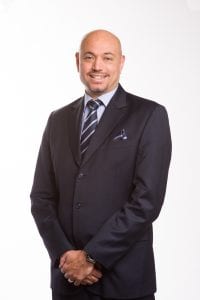 Chris Lloyd. Managing Partner, Aero Infinity. Nanyang EMBA Class of 2016 (Aviation track) |
| FROM Nanyang Admissions Blog: Participant’s experience in the MFE programme |
|
Article written by: Zhang Yiwen (MFE Participant 2017-18) The main reason I’m writing this is that most people in China do not know much about financial engineering, but recently many have asked me about Nanyang Technological University’s MSc. Financial Engineering (NTU or NTU MFE). So I’m here to summarize and share my own experience studying NTU MFE for your reference. It is purely personal and may not apply to everyone. You may judge according to your own circumstances. My hope is that it provides some convenience for those interested in working in finance or applying for a spot in NTU. If you prefer a glimpse rather than reading, please check out the NTU MFE site: https://www.nbs.ntu.edu.sg/Programmes/Graduate/MScFE/Pages/Home.aspx (Make sure you read this article in a WiFi-equipped environment because there will be a lot of pictures.) To start with, I’d like to say something about myself. I’m a full-time MFE graduate at NTU. I used to be an engineering student at a Shanghai university of Project 985. Now comes the question: How does it feel studying MFE at NTU? The NTU boasts a really beautiful environment. Just take a look at the following pictures (provided by NTU Graduate Student Council).  Fig.1. Landmark Hive (many multimedia classrooms to be reserved)  Fig.2 ADM Library   Fig.3&4 Interior of Business Library 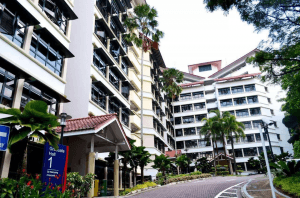 Fig.5 Student Dormitory (Buildings for students aplenty, with a pleasant environment. No need to rent a place like NUS students.) Part1: Financial Engineering
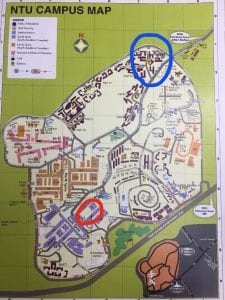 Part3: NTU MFE
 2. About employment, NTU and NUS graduates won’t worry about finding a job in Singapore. It is learned that NUS MFE graduates would choose risk management while NTU MFE graduates mostly go for quantitative trading. (Only personal knowledge, not 100% authentic) 3. What are the requirements for application? As is clearly stated in the above site, a language test report, a GRE or GMAT report and a series of materials are required for application. The only thing to note is that the application materials should be sent to the Admissions’ mailbox. 4. As for the interview that follows, applicants will be asked to have an interview via Skype once the resume meets the requirements. There will be some math questions during the interview for which you may prepare. In this regard, reference articles abound. Part4: Life at NUS (learning, recreation and traffic)
So much for today, I may update this from time to time. And the last thing: You are welcome to join NTU MFE! |
| FROM Nanyang Admissions Blog: (Almost) Everything you need to know about the MFE programme. |
|
Article written by: Zhang Yiwen (MFE Participant 2017-18) The main reason I’m writing this is that most people in China do not know much about financial engineering, but recently many have asked me about Nanyang Technological University’s MSc. Financial Engineering (NTU or NTU MFE). So I’m here to summarize and share my own experience studying NTU MFE for your reference. It is purely personal and may not apply to everyone. You may judge according to your own circumstances. My hope is that it provides some convenience for those interested in working in finance or applying for a spot in NTU. If you prefer a glimpse rather than reading, please check out the NTU MFE site: https://www.nbs.ntu.edu.sg/Programmes/Graduate/MScFE/Pages/Home.aspx (Make sure you read this article in a WiFi-equipped environment because there will be a lot of pictures.) To start with, I’d like to say something about myself. I’m a full-time MFE graduate at NTU. I used to be an engineering student at a Shanghai university of Project 985. Now comes the question: How does it feel studying MFE at NTU? The NTU boasts a really beautiful environment. Just take a look at the following pictures (provided by NTU Graduate Student Council).  Fig.1. Landmark Hive (many multimedia classrooms to be reserved)  Fig.2 ADM Library   Fig.3&4 Interior of Business Library  Fig.5 Student Dormitory (Buildings for students aplenty, with a pleasant environment. No need to rent a place like NUS students.) Part1: Financial Engineering
 Part3: NTU MFE
 2. About employment, NTU and NUS graduates won’t worry about finding a job in Singapore. It is learned that NUS MFE graduates would choose risk management while NTU MFE graduates mostly go for quantitative trading. (Only personal knowledge, not 100% authentic) 3. What are the requirements for application? As is clearly stated in the above site, a language test report, a GRE or GMAT report and a series of materials are required for application. The only thing to note is that the application materials should be sent to the Admissions’ mailbox. 4. As for the interview that follows, applicants will be asked to have an interview via Skype once the resume meets the requirements. There will be some math questions during the interview for which you may prepare. In this regard, reference articles abound. Part4: Life at NUS (learning, recreation and traffic)
So much for today, I may update this from time to time. And the last thing: You are welcome to join NTU MFE! |
| FROM Nanyang Admissions Blog: Deborah’s journey in the MSc Acc programme |
 Ngo Thu Tran (Deborah) MSc Acc, Class of 2018 I am currently a Master of Accountancy (MSc Accountancy) student at the Nanyang Business School (NBS). This is my second time receiving professional and academic training from NBS, having previously done my undergraduate studies here, where I majored in Business Administration. I am originally from Vietnam, and Ho Chi Minh city is my dear hometown. After I graduated from NBS in 2014, I pursued my first job at IBM Singapore as a Graduate Consultant, specialising in SAP FI (Financial Accounting) Consulting. My job as an SAP FI Consultant has nurtured in me a strong interest and determination to pursue Accounting career in the long term. My stint at IBM allowed me to gain a good understanding about accounting transactional practice at the client’s enterprise, mostly from the perspective of Accounting Information System, i.e. how the IT infrastructure is built to support the accounting function. However, being a former Business Administration student, I yearn to explore the Accounting area more from the business perspective instead of from the technical system’s point of view. Hence, I decided to go back to school again to relearn the basics. The MSc Accountancy programme allows me to gain a greater appreciation of Accounting, from the perspective of a true Accounting professional. The MSc Accountancy progamme offered by NBS is naturally my first choice because the Accounting division of NBS is well-renowned for its long and illustrious history. The prospect of learning from world-class professors, interacting with batch mates and gaining deeper insights of Singapore Financial Reporting Standards (adopted from IFRS) are additional factors that pull me into this programme. At the same time, this programme is no easy breeze either. The programme is structured intensively, with lots of team projects and other assessment components, requiring hard work and consistent efforts. I can’t even recall how many nights I have burned the midnight oil since enrolling into this programme. However, being out of my comfort zone is good for my own personal development – this trains me to be more competitive and ready when I rejoin the real working life later. Having spent a decent amount of time living in Singapore, I have learnt a lot and grown both personally and professionally. Singapore, being a melting pot, has allowed me to interact with so many people from different walks of life, seeing different sides of the world through their lenses. I have learnt to respect and embrace the diversity here. So far, it has been an amazing experience for me at NBS. I have understood many practices in accounting that I did not fully grasp earlier. I have been exposed to new concepts and practices in Accounting that I was not previously aware of. I am immensely grateful for the opportunity to be a part of this programme and the NBS family (again). I hope to embark on a career in Accounting after I graduate from the MSc Accountancy programme, and I am absolutely confident that I will be able to apply what I have learnt in NBS and put it into practice at my future employers. Learn more about the MSc Accountancy programme. |
| FROM Nanyang Admissions Blog: A morning well spent at the NBS CEO Breakfast Series |
|
Article contributed by: Maria Clara, MBA Class of 2018. On 19th of September 2017, MBA participants, faculty and alumni met again for the NBS CEO Breakfast Series. The event was held at The Fullerton Hotel and the topic of the morning was Women in Leadership.  The panel of speakers was integrated by Diana The, Chief Counsel at AON Hewitt APAC for the Middle East & Africa; Elaine Yeo, Managing Director – ASEAN for Laerdal Singapore Pte Ltd; Stephanie Syptak-Ramnath, Chargé d’affaires, a.i. at the U.S. Embassy in Singapore; and Yuko Nakamura, R&D Director for Procter & Gamble. The session was moderated by Prof. Ravinder Agarwal, and our Dean for Postgraduate Studies Prof. Nilanjan Sen introduced the event to the audience.  I was very surprised –and satisfied- by the significant attendance from our male classmates. As the topic of the event was Women in Leadership I expected most of the audience to be women. Thank you guys for the great support! The session started with Prof. Agarwal asking the panelists about their path to leadership and success. Each of them gave a short introduction of the remarkable moments on their way to leadership positions. When it came the time for Yuko Nakamura, she took some household and skin care products out of a bag and said she preferred to tell her story illustrating it with some of the products she has helped to develop at P&G. She mentioned how proud it made her to know that those products are present in the house of her friends or neighbors.  The speakers were also asked about what they considered to be successful and Diana The mentioned that to be successful is not a state, it’s what is lived on the way. She emphasized that we need to question who defines success and that it is different for every person. Elaine Yeo mentioned the importance of the family support she got to develop her career, and how help from family is crucial for working women in Asia. She commented how grandparents play an active role in the upbringing of children of working women in Asia, compared to North America or other European countries. Millennials were also a topic of discussion and Stephanie Syptak-Ramnath commented on the effort us as millennials should do to be perceived as serious and less informal. She mentioned how our executive presence matters as not everybody will end up working in a start-up. Other panelists agreed on how we need to be less fragile, not take things personally as we cannot spend our careers feeling hurt by others. It was a very interesting morning, an opportunity to learn from and share with leaders in different areas of society. Looking forward to the next NBS CEO Breakfast event! 
|
| FROM Nanyang Admissions Blog: Entering into the prison, with that glorifying feeling |
|
The Yellow Ribbon Prison Run was an opportunity for our community to participate in teams of 4, or individuals, in a 5K or 10K walk/run. This event was held on Sunday, September 17th, at 7AM. Our NBS group of participants woke up early, and left the NTU campus together barely awake at 6am to reach the SAF Field, Farnborough Road near Changi Villiage, the starting point of the race. We arrived and the race had already just begun, but this didn’t deviate us from stretching, preparing, and starting together. We cheerfully took a “we-fie” at the start of the race, and the feeling of excitement began! 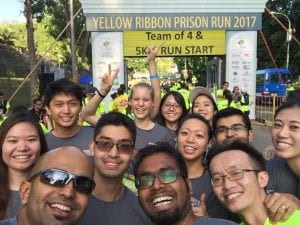 Photo from Left: Ai-Tim, Mario, Pravin, Jaime, Katja, Ming Hui, Bhavitta, Jennifer, Amar, Vineet, Chao Yang, Kristine at the Yellow Ribbon Prison Run Start. Each time I saw a gray shirt in the crowd as I was running, I knew it was time to run and encourage each other and push forward until the finish line. I could see many yellow shirts in the crowd, but only the Nanyang MBA students had a distinct gray shirt that we wore LOUD AND PROUD. 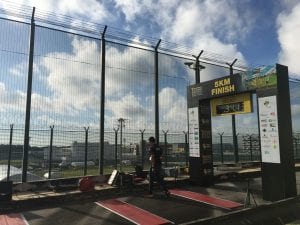 This event was particularly right after midterms. It was a wonderful and refreshing experience being outdoors, at a beautiful racecourse with our classmates, whom are usually sitting next to you in a lecture hall or study room. As the race went on, the run got tougher. However, that didn’t keep the sideline audience from cheering you on every step of the way. Every time I saw a “gray shirt with Nanyang MBA,” I pushed myself to run a little bit faster. The feeling was exhilarating! After spending nearly half an hour in the humidity, I could see the 5km finish line! Entering into the Prison with that glorifying feeling, I felt the satisfaction of completing a race in Singapore. I was proud to be able to given the opportunity to provide ex-offenders/prisoners with possibilities and second chances of their reintegration into society. It was a great feeling to give back to the community with the help of our MBA Participants. 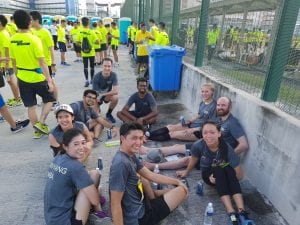 We gathered together as an NTU MBA class, united with our stomachs ready to be filled. Our school treated us to a nice lunch afterwards, at a local restaurant called Jubilee Coffee House & Bar with delicious food that we all deserved and earned. This was a great experience, and has encouraged me to participate in more runs this year. “Take that Chance, Make Your Change” 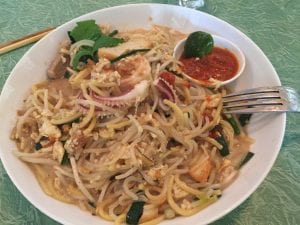 
|
| FROM Nanyang Admissions Blog: “When the power has shifted from the brand to the consumer” |
|
Article contributed by Gurtej Singh, MBA Class of 2018. On Sep 12, the Nanyang Business School hosted guests from Wunderman Asia Pacific, a leading digital agency, to join the Marketing class of the Full-Time MBAparticipants, for a discussion on the topic of “Marketing Communications in the Age of Fragmented Media and Digitization”. This session was conducted in an interactive “talk show” format, with Prof. Lewis Lim (the Marketing Professor) as the moderator and with 75 MBA participants.   Krishnan Menon (Chief Client Officer), Mark Miller (Head of Planning) and Wedad Sunny (Client Services Director), the 3 guest speakers from Wunderman spoke about the importance of marketing in this digital age. We are watching audio visuals all the time, everywhere, whether it is our phones, tablets, PCs, smart TVs or cinema and we are still listening to audio. A company such as Spotify has as much as data as Facebook does. Spotify knows the time path of what we listen to, what device we are on, how we switch between songs, when have we gone out for a walk since the music stopped playing on our laptop and started playing on our cell phone, they know where we are walking, so Spotify could interrupt us and say: “Turn left now, there is a promo at Zara.” Companies can store everyone’s Facebook links, Linked In pages, Twitter feeds, photographs from social media, number, address – These companies can help deliver ads directly to the intended audience. This sort of “uber” personalization is the answer for marketers in this digital age. If we look at content and delivery in this way, there is so much power in digital marketing. However, a big challenge with Marketing in this Digital Age is Brand Safety and Ethics. One school of thought says blacklist fake sites, but the way to do is actually opposite – by Whitelisting. “I want be on these sites and not on other sites.” This is the sort of thinking a company should follow. For example, if you’re HSBC, you want to be on FT.com, BBC.com, Facebook, couple of local news sites in each country and that’s it! It is up to us as the marketing community to be responsible about Brand safety and ethics, as this is an easy hurdle to overcome.   Consumers are kept at the heart of the business, in today’s age of fragmented media and digitalization. Amazon algorithms work that way – for example look at trunk nodes (Homecare), Branch nodes (Laundry) and Leaf notes (Detergent). What are the words and strings associated with these nodes. This is how you understand consumer insights. For example, consumers are looking at softeners that don’t smell. This is how digital marketing is helping. Thus, the fundamentals of marketing in today’s age is – DO NOT JUST LISTEN TO YOUR CONSUMERS, ALSO GO A STEP FURTHER AND ACKNOWLEDGE THEM! Consumer is centric – demographically, psycho-graphically, media habits, consumption habits, environment – that is the blueprint of marketing in today’s day & age.  L to R: Krishnan Menon, Mark Miller, Wedad Sunny and Prof Lewis Lim |
| FROM Nanyang Admissions Blog: First gathering of Japanese Language and Culture Club |
|
Article contributed by Tony, MBA Class of 2018. One of the social club in Nanyang MBA ‘Japanese Language and Culture Club’ had a memorable first gathering at MBA Lounge on Friday, September 22nd. At this meeting, the two ‘supreme leader’ introduced yearly operating plan of the club, and had introduction session of all members in both English and Japanese. Everyone shared their passion and interest in learning Japanese and its culture and Japanese students and their family also joined to help members to understand its language and culture. Here are some comments from the participants. “The first Japanese Language club event was so nice! Tony and Xia, thank you for organizing the event! As one of Japanese students, I am happy to learn each other through Japanese language. I cannot wait the next event!!! Thank you again” – Masashi “It is a fantastic experience for me. I am keen on Japanese culture and language for years. And it is really a good union that I did learn some basic conversation such as greeting. I hope I can get more chances to attend and know more for my BSM Japan trip.” – Lucas “Thank you so much for providing such a great opportunity to study Japanese language and culture. this club builds a bridge of friendship in MBA with full love. thank you” – Sheng “The only language & cultural club I attend this year is this Japanese club, thanks for taking this up and we enjoyed our first event very much. Surprisingly, many Fellows MBA students also supported to attend this event, through which we shared experiences and interests together. Looking forward to next event!” – Shan shan It is worth noting that this event led many Nanyang Fellow MBA students to join with a lot of interest in Japanese culture. This club can be the place of communication and conversation among various MBA programs in Nanyang Business School.   Thanks to the successful start of the club gathering, Japanese Language and Culture Club is now preparing for more interesting and fruitful session in this upcoming trimester 2. In this second gathering, the club hopes to generate more participations from all MBA programs, more interactions among students. Please look forward to the club’s second meeting in trimester 2.  
|

|
|
||
|
Hi Generic [Bot],
Here are updates for you:
ANNOUNCEMENTS
Watch earlier episodes of DI series below EP1: 6 Hardest Two-Part Analysis Questions EP2: 5 Hardest Graphical Interpretation Questions
Tuck at Dartmouth
GMAT Club REWARDS
|